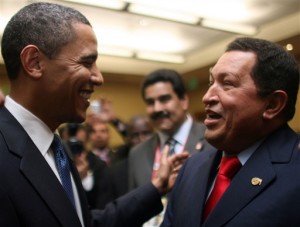
It finally happened…the moment we’d all been waiting for! After years of strained relations in which George Bush would scarcely say his name, Venezuelan President Hugo Chavez at last got the respect he deserves from a US president.
Those of you who’ve hoped for improved US – Venezuela relations all these years no doubt smiled all day Saturday after seeing the photos. Maybe a few of you were even a little misty-eyed. The now-famous handshake even made the front page of the Saturday New York Times and has since been the subject of endless television, radio and print commentary.
The two leaders were friendly and gregarious, and Chavez presented Obama with a seminal work by Eduardo Galeano, The Open Veins of Latin America. The book has since enjoyed a meteoric rise in sales on the internet. It may not be easy to find in the library for a while, but is worth a read if you can get your hands on a copy.
It appears that the Summit of the Americas was a monumental step forward. From easing restrictions on Cuba to greeting leaders with an air of mutual respect and equality, things seem to be changing for the better.
Since the handshake, both the US and Venezuela are now considering the return of ambassadors. It remains to be seen how bilateral relations will play out, but prospects for respect and cooperation seem a bit brighter this Monday morning.

 UNESCO’s Institute of Statistics says that Venezuela has the second-highest rate of university enrollment in Latin America. At 83% enrollment, Venezuela is second only to Cuba, and far above the regional average of just 30%,
UNESCO’s Institute of Statistics says that Venezuela has the second-highest rate of university enrollment in Latin America. At 83% enrollment, Venezuela is second only to Cuba, and far above the regional average of just 30%, 
 Another Venezuelan film participating in the Festival of New Latin American Cinema in Havana escaped our notice yesterday: Cyrano Fernandez by director Alberto Arvelo.
Another Venezuelan film participating in the Festival of New Latin American Cinema in Havana escaped our notice yesterday: Cyrano Fernandez by director Alberto Arvelo. The 30th annual
The 30th annual  On October 6, 1976, 73 people were killed in the bombing of Cubana Airlines flight 455. To mark the 22nd anniversary of this tragic loss of life, the New York University chapter of the National Lawyer’s Guild staged a tribunal of the man accused of this and other acts of terrorism. Luis Posada Carriles, a former CIA agent and current Miami resident, is wanted in several countries
On October 6, 1976, 73 people were killed in the bombing of Cubana Airlines flight 455. To mark the 22nd anniversary of this tragic loss of life, the New York University chapter of the National Lawyer’s Guild staged a tribunal of the man accused of this and other acts of terrorism. Luis Posada Carriles, a former CIA agent and current Miami resident, is wanted in several countries  Venezuela has
Venezuela has  For those with an interest in the wild world of big cats and other critters, two news stories from this week will surely delight.
For those with an interest in the wild world of big cats and other critters, two news stories from this week will surely delight. We love petrocasas, the
We love petrocasas, the 




